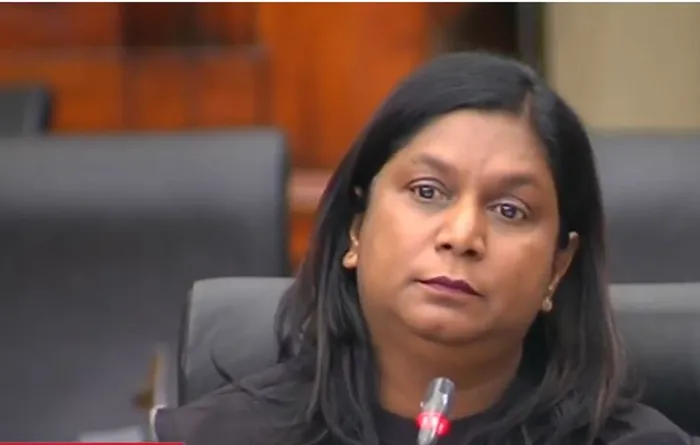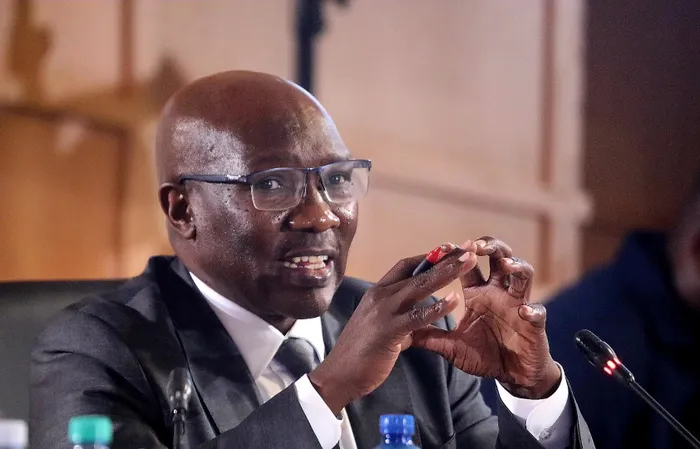
Senior prosecutor Advocate Andrea Johnson. Screengrab IDAC Head Andrea Johnson Defends Arrests of Crime Intelligence Officials Before Parliamentary Committee
Image: IOL
Andrea Johnson, Head of the Investigating Directorate Against Corruption (IDAC), strongly defended her office's decision to arrest Lieutenant General Dumisani Khumalo, head of Crime Intelligence, and six other senior police officials on corruption and fraud charges.
Speaking before the Parliamentary Ad Hoc Committee on Thursday, Johnson emphasised the investigation's legitimacy and thoroughness, as well as the subsequent arrests.
The committee is probing allegations of criminal infiltration, corruption, and political interference within South Africa’s justice system, following explosive claims made in July by KwaZulu-Natal Police Chief Lieutenant General Nhlanhla Mkhwanazi.
Mkhwanazi said IDAC was involved in interfering with Crime Intelligence operations, particularly surrounding the arrest of General Khumalo earlier this year.
Johnson addressed these claims, clarifying the process leading to Khumalo’s arrest and rebutting allegations of undue interference or dramatic tactics.

Lieutenant-General Dumisani Khumalo, divisional head of Crime Intelligence, told the Madlanga Commission that the Hawks and JMPD obstructed justice during the arrest of murder-accused businessman Katiso 'KT' Molefe.
Image: Independent Media
According to Johnson, the arrests were part of a methodically authorised prosecution process that unfolded between May and June 2025.
She explained that after receiving a referral and conducting investigations, the prosecution team, in collaboration with the Directorate of Public Prosecutions (DPP), prepared and executed the arrests.
“I informed General Khumalo of the intended arrest. When approached, there was no obstruction from him. He cooperated fully, entering the vehicle quietly.”
“Throughout the arrest and transfer to the Brooklyn Police Station, his security detail accompanied him and was aware of his whereabouts at all times. There was no dramatic incident as alleged; IDAC does not conduct media-style arrests.”
Johnson also highlighted that the IDAC informed the DPP director but did not notify the National Police Commissioner General Fannie Masemola before the arrest, a decision she justified on procedural grounds.
One point of contention raised by committee members was the bail conditions imposed on Khumalo and others, which prohibited them from accessing their Crime Intelligence offices.
“Several witnesses in this case are employees of Crime Intelligence who reported victimisation and intimidation,” she said.
She added that to protect the integrity of their testimonies and their safety, the court imposed conditions preventing the accused from returning to their offices.
“This was not intended to disrupt their work but to prevent witness intimidation.”
Norman Arendse SC, leading the evidence, challenged the impact of such restrictions, noting that senior officials remain employed and active within Crime Intelligence in acting capacities.
Johnson acknowledged the difficulty but maintained that physical meetings continue to ensure operational continuity outside of the implicated offices.
On the substance of the case against Khumalo and co-accused, Johnson outlined findings indicating manipulation of appointment processes within Crime Intelligence’s Technical Support Services (TSS) unit.
“The accused formed a selection panel chaired by General Khumalo, comprising co-accused members who shortlisted candidates in a way that circumvented standard procedures.”
“They misrepresented candidates’ qualifications, secured undue security clearances, and awarded employment positions as a form of gratification, specifically favouring Brigadier Dineo Mokwele.
She added, “She lacked the necessary skills and experience for the strategic position granted, which placed her in a key role overseeing sensitive procurement processes.”
Johnson elaborated that this group dynamic effectively enabled corrupt appointments to influence procurement decisions for devices critical to Crime Intelligence operations - including interception and listening devices - without proper oversight.
Addressing concerns about whether the police minister or his office influenced the process, Johnson denied that IDAC wrote any letters or directives to political leadership, underscoring the investigation’s independence.
Throughout the committee hearing, Johnson maintained that the arrests and ongoing litigation are part of a broader effort to root out corruption embedded in the intelligence and law enforcement sectors.
Meanwhile, at the parallel Madlanga Commission investigating the same infiltration into the justice system, Khumalo said he was arrested to delay investigations into severe criminal cases linked to the criminal syndicate.
thabo.makwakwa@inl.co.za
IOL Politics
Related Topics: